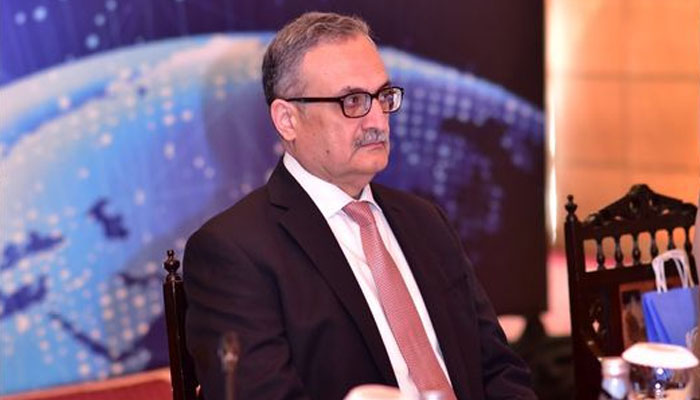Pakistan stresses developing countries’ equitable access to AI
Qazi has stressed its need and championed equitable access to AI technologies, with a particular focus on supporting developing countries
ISLAMABAD: Speaking about the importance of global cooperation for a responsible artificial intelligence (AI) governance, Pakistan’s Foreign Secretary Ambassador Syrus Sajjad Qazi has stressed its need and championed equitable access to AI technologies, with a particular focus on supporting developing countries.
He was speaking here Friday evening on the conclusion of the workshop on international security, hosted by the Center for International Strategic Studies (CISS) in collaboration with the United Nations Institute for Disarmament Research (UNIDIR), Geneva.
The workshop focused on exploring the convergence of AI and cyberspace in the context of global security, emphasizing the evolving geopolitical dynamics, the security impacts of emerging technologies, and their ethical considerations.
Pakistan’s position on AI, as shared by the foreign secretary, is characterized by a recognition of the technology’s dual nature, a commitment to international collaboration for responsible governance, active participation in global discussions, an inclusive approach to policymaking, and advocacy for equitable access to AI technologies for all nations, especially developing countries. “Pakistan emphasizes the need for international cooperation to develop a legally binding framework governing the responsible uses of cyberspace and artificial technologies. And Pakistan believes in a rule based international order promoting transparency accountability and the protection of critical civilian infrastructure,” the foreign secretary said.
Syrus Qazi reminded that Pakistan acknowledges the dual nature of these technologies, and the challenges unregulated military uses pose to global and regional security. As a responsible member of the international community, he asserted Pakistan is strongly committed to addressing these challenges.
Pakistan, Ambassador Qazi said, is actively engaging the international community on multilateral forums in promoting dialogue and cooperation at the regional and global levels to address cyber threats and mitigate the risks associated with the military applications of artificial intelligence.
The country, he said, is also advocating the adoption of an inclusive approach that involves all stakeholders including governments private sector, academia, and civil society to collectively develop strategies for a safe secure stable open cyberspace for all.
He emphasized Pakistan’s strong support for the principle of fair, unconditional, and equitable access to new and emerging technologies for all countries. Islamabad, he noted, firmly opposes the imposition of undue restrictions on access to emerging technologies. Such restrictions, especially in the name of security, he noted, could hinder the development of countries in the realms of science and technology risking the creation of a new layer of discrimination between developed and developing countries. UNIDIR’s senior researcher Dongyoun Cho said many ethical issues emanate from data as it is the main driver of recent advancements in AI. It can produce ethical and humanitarian problems as it can be incomplete, low-quality, and incorrect or false, Cho added.
-
 Andrew, Sarah Ferguson Refuse King Charles Request: 'Raising Eyebrows Inside Palace'
Andrew, Sarah Ferguson Refuse King Charles Request: 'Raising Eyebrows Inside Palace' -
 Adam Sandler Reveals How Tom Cruise Introduced Him To Paul Thomas Anderson
Adam Sandler Reveals How Tom Cruise Introduced Him To Paul Thomas Anderson -
 Washington Post CEO William Lewis Resigns After Sweeping Layoffs
Washington Post CEO William Lewis Resigns After Sweeping Layoffs -
 North Korea To Hold 9th Workers’ Party Congress In Late February
North Korea To Hold 9th Workers’ Party Congress In Late February -
 All You Need To Know Guide To Rosacea
All You Need To Know Guide To Rosacea -
 Princess Diana's Brother 'handed Over' Althorp House To Marion And Her Family
Princess Diana's Brother 'handed Over' Althorp House To Marion And Her Family -
 Trump Mobile T1 Phone Resurfaces With New Specs, Higher Price
Trump Mobile T1 Phone Resurfaces With New Specs, Higher Price -
 Factory Explosion In North China Leaves Eight Dead
Factory Explosion In North China Leaves Eight Dead -
 Blac Chyna Opens Up About Her Kids: ‘Disturb Their Inner Child'
Blac Chyna Opens Up About Her Kids: ‘Disturb Their Inner Child' -
 Winter Olympics 2026: Milan Protestors Rally Against The Games As Environmentally, Economically ‘unsustainable’
Winter Olympics 2026: Milan Protestors Rally Against The Games As Environmentally, Economically ‘unsustainable’ -
 How Long Is The Super Bowl? Average Game Time And Halftime Show Explained
How Long Is The Super Bowl? Average Game Time And Halftime Show Explained -
 Natasha Bure Makes Stunning Confession About Her Marriage To Bradley Steven Perry
Natasha Bure Makes Stunning Confession About Her Marriage To Bradley Steven Perry -
 ChatGPT Caricature Prompts Are Going Viral. Here’s List You Must Try
ChatGPT Caricature Prompts Are Going Viral. Here’s List You Must Try -
 James Pearce Jr. Arrested In Florida After Alleged Domestic Dispute, Falcons Respond
James Pearce Jr. Arrested In Florida After Alleged Domestic Dispute, Falcons Respond -
 Cavaliers Vs Kings: James Harden Shines Late In Cleveland Debut Win
Cavaliers Vs Kings: James Harden Shines Late In Cleveland Debut Win -
 2026 Winter Olympics Snowboarding: Su Yiming Wins Bronze And Completes Medal Set
2026 Winter Olympics Snowboarding: Su Yiming Wins Bronze And Completes Medal Set




